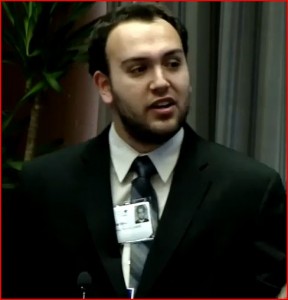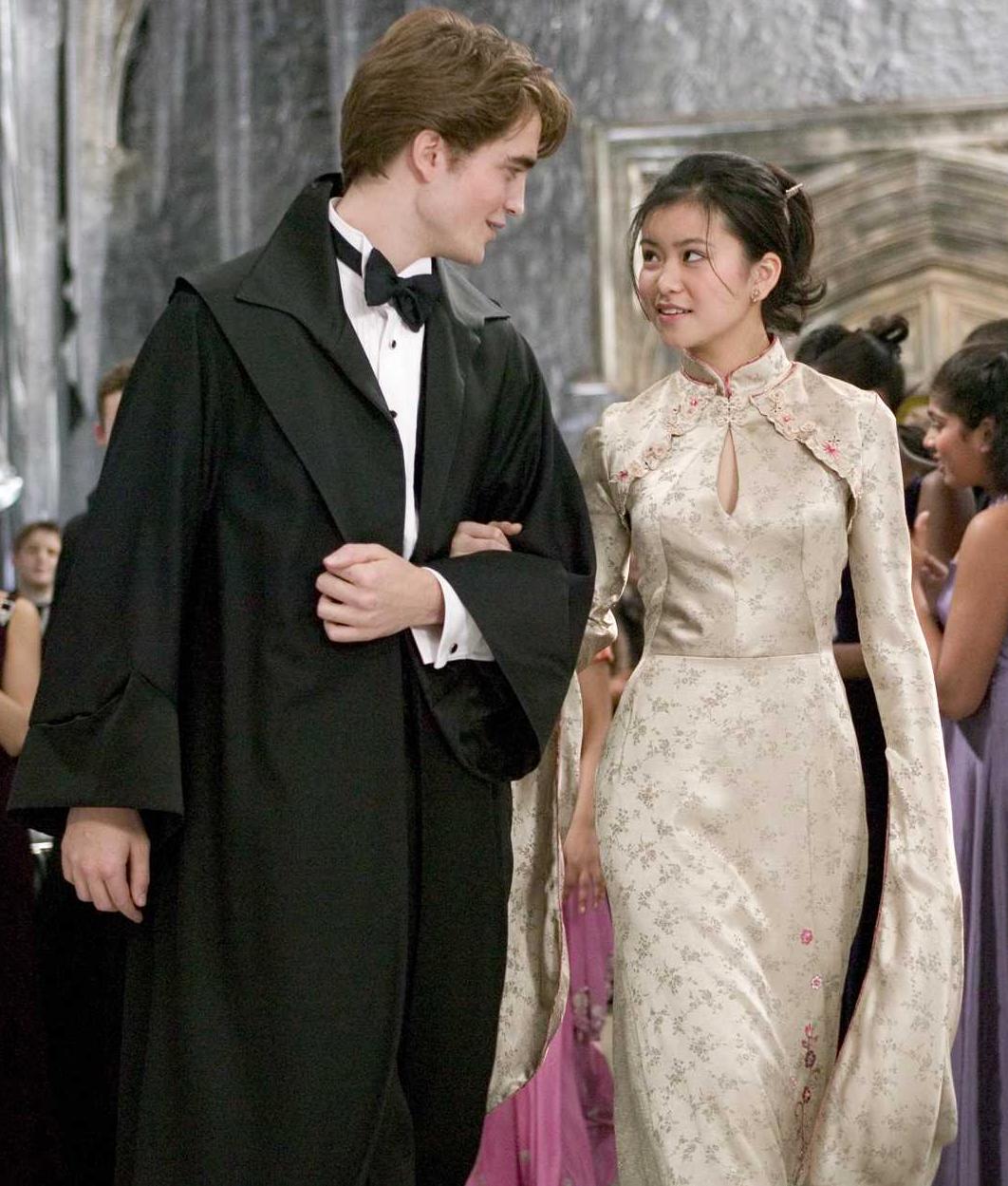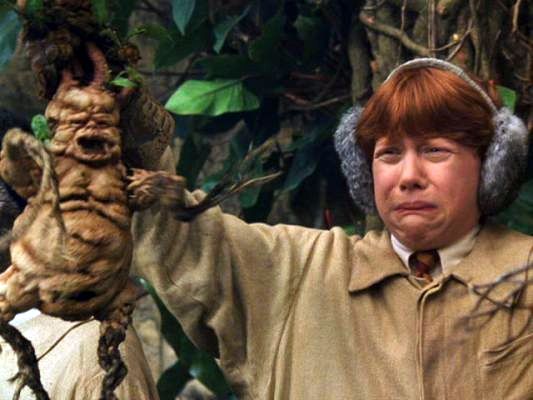Have you ever wondered what it’s like to have autism? James Williams, an adult with autism, cleverly uses Harry Potter analogies in this speech he wrote for late-elementary and middle-school audiences to help them understand what life is like with autism.
I’m here to talk about Harry Potter, a fictional British boy who, at the age of eleven, learns that he is a wizard from Rubeus Hagrid, Keeper of the Keys and Grounds and Hogwarts School of Witchcraft and Wizardry. I’m also here to talk about autism, because I have autism.
What is autism? It is not a sickness like chicken pox, measles, or a lifelong illness like diabetes. It is a mental disorder. It is a different way of processing information, which makes it difficult for me to understand you. And sometimes, it’s hard for you to understand me.
Autism is invisible to the human eye. I do not look autistic. But I behave like an autistic person. You might think that because someone with autism sees the world differently, and experiences things differently, that in order to really understand what an autistic person is dealing with, you have to have autism. In fact, even though I do see the world differently and do experience the world differently, you don’t have to have autism in order to understand what autistic kids deal with.
Harry Potter has experienced many things that autistic individuals have to endure daily. Most of you know who Harry Potter is. For this reason, I’m going to show you what it’s like to have autism by relating it to some things Harry Potter has had to deal with.
In his fourth year at Hogwarts, Harry becomes the fourth champion in a tournament called the Triwizard Tournament. Part of the tournament involves hosting the Yule Ball, a dance which is held on Christmas Day in the book, or Christmas Eve in the movie.
As stated in the fourth book:
“Potter, the champions and their partners—“
“What partners?” Harry asked Professor McGonagall.
“Your partners for the Yule Ball, Potter,” she said. “Dance partners.”
“Dance partners?” He felt himself going red. “I don’t dance,” he said quickly.
“Oh, yes, you do,” said Professor McGonagall. “Traditionally, the champions and their partners open the ball.”
“I’m not dancing,” Harry said.
“It’s traditional,” Professor McGonagall replied. “You are a Hogwarts champion, and you will do what is expected of you as a representative of the school. So make sure you get yourself a partner, Potter.”
So, Harry has to go to the Yule Ball and has to find a girl to be his dance partner, and Harry is terrified of asking a girl to dance with him. As author J. K. Rowling later writes:
Now that he had taken on a dragon, and was facing the prospect of asking a girl to the ball, he thought he’d rather have another go with the dragon.
Harry latter comments:
“Why do they have to move in packs? How are you supposed to get one on their own to ask them?”
Harry does have mixed feelings about this: First, he does not want to do it, so when he does get asked to the ball by other students, he instinctively turns them down, because he personally does not want to go to the ball. But since he has to do it, he decides to ask the girl that he has a crush on, Cho Chang. She is a year older than he is, an excellent Quidditch player, and extremely pretty. He finds her with her two friends and is initially paralyzed:
“Er—Cho? Could I have a word with you?” he asks.
All the girls around Harry started to giggle. She didn’t, though, but said, “Okay,” and led him away from her classmates.
Harry turned to look at her and his stomach gave a weird lurch as though he had missed a step going downstairs.
“Er,” he said.
He couldn’t ask her. He couldn’t. But he had to. Cho stood there looking puzzled.
“Wangoballwime?”
“Sorry?” said Cho?”
“Do you – do you want to go to the ball with me?” said Harry. Why did he have to go red now? Why?
“Oh, Harry, I’m really sorry,” Cho replied, and she acted as if she meant it. “I’m going with someone else.”
Now, many books have been written and movies made about boys who do not know how to approach girls even though they are secretly in love with them or have crushes on them. But most of those boys do not have trouble approaching their other male friends, or even female friends, like Harry’s friend Hermione Granger. Hermione is a girl and Harry’s friend, but it is never implied that she might be Harry’s girlfriend.
Have you ever been in that situation? Having to approach someone, feeling extremely embarrassed about it, not knowing what to say, and terrified that when you did say something, that person would reject you? Now, even though you might feel a bit uneasy going up to a girl or a boy, do you feel uneasy going up to one of your friends and chatting with them?
Most of you don’t, which means that the uneasiness you feel is not toward everyone. But what if it were? What if you didn’t have any friends, so when you tried to approach anyone you felt uneasy, and that person laughed at you because they saw your uneasiness? You wouldn’t feel happy. Would you want to go and try to make friends with other kids if you felt uneasy whenever you approached another child? You probably wouldn’t. Why inflict that terror on yourself?
For us with autism, it’s not just approaching a girl that makes us feel uneasy. For some autistic kids, approaching any kid our age makes us feel uneasy. Kids with autism don’t know the right thing to say in front of other people. They’re scared they’re going to get rejected. And when they do say something, they are often rejected or teased by other people. And that’s why many autistic kids don’t want friends preferring to be left alone. But teachers and parents don’t accept the child who is content being alone. In fact, social skills are a big part of what you have to learn in school. How many of you have worked on school projects where you’ve been put in a group of three or four kids you had to work with, or been partnered with another child to do an assignment? And sometimes the teacher assigns you the person without even giving you a choice.
To Harry Potter, Cho Chang is Cho Chang. To an autistic child, every child is a Cho Chang—someone who might reject him outright, say no for a legitimate reason, as Cho did, or accept him, which would be very unlikely. It is this uneasiness that makes socializing so terrifying for an autistic child. Because many autistic children have already been rejected, they don’t want to feel that heartbreak again. And, since many kids use stories like “I’m going with someone else” as polite lies, they don’t believe them when they say that.
Other autistic kids do not want to be left alone and are looking for friends. Harry, after all, did have a crush on Cho Chang, despite his uneasiness with approaching her. Thus, these kids want to try making friends. But many kids who aren’t autistic aren’t very nice to them. They’ll even do naughty things and get in trouble with the school staff or law enforcement because their friends dared them to do something bad.
Many kids your age were not very nice to me when I was in the fourth and fifth grade. I was thought of as weird. They’d say my shirt was on backwards when it wasn’t. They’d call me weird names like Baloney Face and Oscar Mayer Weiner Hot Dogs. Some of you might be guilty of teasing. I ask you, what is so attractive about making fun of someone who is different? Why would you enjoy calling someone names like that?
Harry’s friend Hermione illustrates another aspect of autism. Hermione is a workaholic. She’s always studying, much more than Harry or their friend Ron, and even came to Hogwarts knowing much of the curriculum before the teachers even taught her. Most of her teachers think she is the brightest wizard in her class, except Professor Snape, who thinks of her as an insufferable know-it-all and punishes her for it.
It’s not unusual for people who are enthusiastic about a subject to get carried away. Many kids with autism are the same way. Hermione enjoys studying magic so much, she goes overboard. Well, many autistic individuals obsess over things and are extremely fixated on specific topics, and, like Hermione, they may act like insufferable know-it-alls at times. But if many autistic individuals are know-it-alls, why was Hermione not given an autistic diagnosis?
That’s because Hermione is expected to be interested in and know something about magic, and since she knows more than she should, she is praised. But autistic individuals like me are obsessed by things we’re not supposed to obsess over, even if those obsessions are signs of great intelligence.
What if Hermione was not obsessed with her magic? What if she obsessed over something else . . . like, say, the multiple relations between calendar dates? What if she talked about how the sum of the digits of January 9 (1 + 9) and April 6 (4 + 6) equaled the same number (10)? Or how about how the sum of the digits of January 2 (1 + 2), February 4 (2 + 4), March 6 (3 + 6), April 8 (4 + 8) May 10 (5 + 10), June 12 (6 + 12), July 14 (7 + 14), August 16 (8 + 16), September 18 (9 + 18), October 20 (10 + 20), November 22 (11 + 22), and December 24 (12 + 24) all equal multiples of 3? What if Hermione went on and on about these subjects instead of the properties of mandrakes or the behavior of boggarts? She would be a know-it-all, and she might just get an autism diagnosis.
This is important because this shows that people with autism aren’t always that different from individuals without autism. Autistic individuals obsess over things like calendar dates because they are interested in them, just as Hermione is interested in all things magic. The motivation is the same; it’s just the subject matter that makes it problematic. Autistic people can also bother people by going on and on about their subject, but Hermione does that too. Even though most of the teachers appreciate Hermione’s knowledge, other students, including Harry and Ron, are frequently annoyed by her.
The properties of mandrakes can also help us understand what it’s like to have autism. What is the trait of the mandrakes that makes working with them so dangerous? Their fatal cry.
But as Professor Sprout says, “As our Mandrakes are only seedlings, their cries won’t kill yet. However, they will knock you out for several hours.”
So what does everyone have to wear before working with the mandrakes in Herbology class? Headphones. In the movie Harry Potter and the Chamber of Secrets, we hear how loud those plants are. We’re not killed by the sound, but the sound is very annoying. Now, what if, everywhere you went, you heard those mandrake sounds, and there was no respite from them until you went to sleep at night? And what if, when you heard those sounds, you were bothered by them, and you fell apart when you heard them?
Many kids with autism have sensitive hearing. It’s like they are always hearing those mandrakes. And just as the baby mandrakes cause people to fall apart, autistic people with super-sensitive hearing fall apart. They might even throw up and be sick if they are anticipating a loud noise such as a school fire drill. They might burst into tears and have to go home. Or they might freeze and be stiff as a board.
Yet, was I allowed to wear headphones to protect my ears from the fire drill? Are most autistic individuals allowed to wear headphones to protect themselves from the mandrakes of the world? Absolutely not. When they try to cover their ears, they frequently get in trouble. And so the mandrakes keep causing them to fall apart, and everyone wonders why.
Before Harry knew he was a wizard, he was raised by his aunt and uncle, Petunia and Vernon Dursley, who were not very nice people. In fact, they’re terrible people, but in addition they are muggles who do not understand magic. When Harry was angry, he unconsciously used magic that he couldn’t explain and the Dursleys did not understand.
One of these times in particular, at the London Zoo, he found himself talking to a boa constrictor, who escapes his cage, causing havoc in the reptile house. Harry does not know that he has the rare ability to speak with snakes. Neither does he know that he is a wizard, and that wizards who are angry tend to use magic even if they do not want to. The Dursleys use this incident to justify punishing Harry, even though he does not know why the snake went free or that his magic caused it to happen.
Then Hagrid, the gamekeeper at Hogwarts School, in the first book, tells Harry that he is a wizard. First Harry is in disbelief. How could he be a wizard? But then, what does Harry feel when he realizes that he is a wizard? Relief. Happiness. Finally, he knows that he’s not weird, and that these strange things were the result of being a wizard.
This is what it is like for someone with autism. Autistic people often have been in the situation of doing something bad, and getting in trouble for it. I used to think about it as an incident where I’d do something wrong, get yelled at, and then explain why I did it. Oftentimes my mother would be proud of me and then I’d tell her something bad I did and she’d soon be furious. My life consisted of many of these incidents.
But sometimes I couldn’t explain why I had done what I had done. Why did I delete the operating system on my father’s computer? Why did I spill the milk? Why did I shatter the glass? Why did I spill the spaghetti? Why did I lose my backpack? Why didn’t I know better?
Kids with autism often make things happen that they can’t explain. And if they don’t know they have autism, they don’t know why, no matter how hard they try, they are always getting in trouble.
How would you feel if, no matter how hard you tried, you always did things that got your parents angry, even if you didn’t intend to do that? But then, how would you feel if you learned that it wasn’t your fault that you did those bad things? Instead, it was due to something beyond your control. Like Harry, autistic people’s “bad” behavior is beyond their control or understanding. But wouldn’t you feel relieved if you learned it wasn’t your fault, and that you weren’t alone? I think you would.
But even though you don’t have autism, and are not wizards, there are more and more people learning they have autism every single day. It is likely that you will meet someone with autism at some point in time in your life. You might already have a brother or sister with autism, or know someone who has autism at this school.
When you are with an autistic child, don’t make fun of him or her. Respect them. Treat them the way you want to be treated.
~ James Williams
Excerpts are from the book Harry Potter and the Goblet of Fire, by J. K. Rowling.
For more by James Williams, click here.





















Have you ever wondered what it’s like to have autism?
Actually, yes, I have often wondered what it would be like to have autism as an accessory that I could remove and reinstall at will, rather than being a full-time member of a neurological minority. (-_Q)